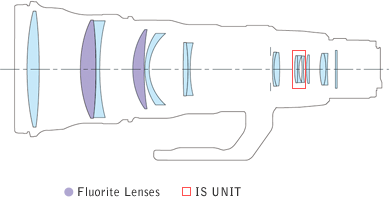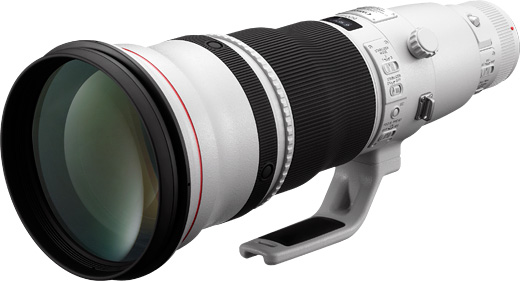- Specifications
- Block diagram
| Marketed | May 2012 |
| Original Price | 1,370,000 yen |
| Lens Construction (group) | 12 |
| Lens Construction (element) | 16 |
| No. of Diaphragm Blades | 9 (circular aperture) |
| Minimum Aperture | 32 |
| Closest Focusing Distance (m) | 4.5 |
| Maximum Magnification (x) | 0.15 |
| Filter | Any 52(WII)-series drop-in filter |
| Maximum Diameter X Length (mm) | 168 x 448 |
| Weight (g) | 3,920 |
In response to the demands of professional photographers, the new Canon EF600mm f/4L IS II USM has been developed as successors to the EF600mm f/4L IS USM released in September 1999, respectively. Offering a level of performance befitting L (luxury)-series models, the new lenses realize improved image quality and significant weight savings, while delivering high durability, and dust-proof and moisture-proof performance, even in harsh shooting conditions.
Incorporating a new optical design incorporating two fluorite lens elements, the new EF600mm f/4L IS II USM compensate for residual chromatic aberration, enabling high-resolution, high-contrast photographic expression free of color fringing around subjects. Featuring optimized lens positioning and Canon’s proprietary Subwavelength Structure Coating (SWC) anti-reflection technology, the new lenses greatly minimize the flare and ghosting commonly associated with digital camera photography. In addition, a redesigned optical and mechanical structure enables the EF600mm f/4L IS II USM to achieve an 27% lighter body design, respectively, compared with the predecessor models.
The Canon EF600mm f/4L IS II USM include high-performance image stabilization equivalent to approximately four shutter-speed stops,*a two-stop improvement over the previous models. Furthermore, IS MODE3, a new function ideal for use when shooting fast-paced action, such as sporting events, joins two additional IS modes that make possible blur-free image capture across a range of shooting conditions.
* Based on a shutter speed of “1/focal length” seconds, considered the limit to prevent hand shake during hand-held photography



